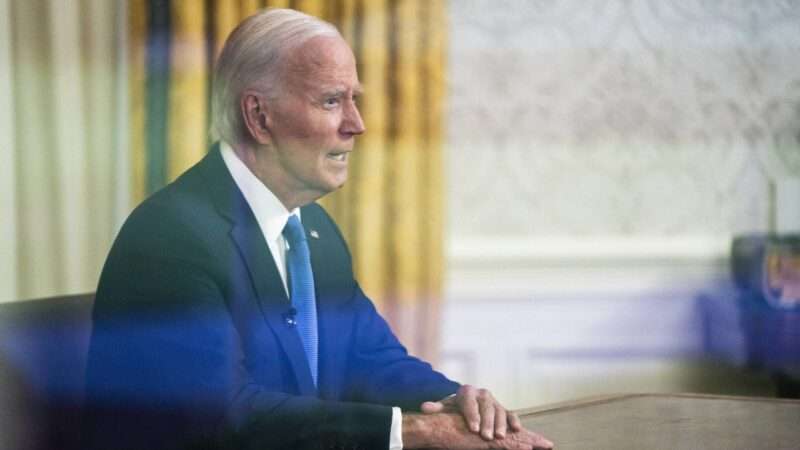
President Joe Biden's decision to exit the 2024 race gave the public a rare look at the Byzantine world of campaign finance law.
It's not a pretty sight. This tangle of often incomprehensible rules highlights the need for a judicial firewall to protect political speech—a "separation of campaign and state."
After Biden stepped away, his presidential campaign committee and its $92 million war chest were essentially handed to Vice President Kamala Harris. Donald Trump's campaign then filed a complaint with the Federal Election Commission (FEC), challenging the legality of the transfer.
While the situation is unprecedented, two things are certain: The law and regulations aren't clear, and the controversy won't be resolved before the election.
There are plausible arguments on both sides of this legal conundrum about whether Harris can take over the campaign account. But the predicament caused by a late-stage candidate replacement illustrates the broader truth that campaign finance laws are inappropriate, unnecessary, and often unconstitutional. They burden the right to political speech via campaign contributions and increasingly burdensome disclosure rules.
The Democrats' current struggle to respond nimbly to these unusual circumstances is just a taste of a much larger problem. Campaign finance law begins with the flawed premise that political speech can be significantly regulated without violating the First Amendment. There are many laws—some that are being challenged in court—intended to protect incumbents and stifle political innovation.
For example, the Georgia election code allows "a leadership committee…chaired by the Governor, the Lieutenant Governor, [or] the nominee of a political party for Governor selected in a primary election" to raise and spend unlimited money in any campaign, including their own. However, rank-and-file lawmakers and other candidates generally cannot. Federal candidates end their ads with their name and "I approve this message" due to a 2002 law that sought to reduce the number of negative ads against incumbents.
Such laws create unintended consequences that can distort the very democratic processes they are written to protect.
The Biden campaign's sudden dissolution is just one example of how campaign finance laws can impede political flexibility and free speech. Similar issues arise with the absurdly restrictive limits on how many ads a political party can run while coordinating the message with their nominees at the top of the ticket. The party is limited to spending just $32.4 million on such ads, a drop in the bucket in an age of billion-dollar presidential campaigns. The limits are far lower for congressional races.
These laws do the most damage at the grassroots level. If you and a friend spend as little as $250 on a few social media ads urging others to vote for a federal candidate, you must file a complex report to the government. If you spend over $1,000, a relative pittance in million-dollar campaigns, the FEC also demands that you register with the agency. You then must report your donations and expenditures with five reports due in an election year that make many tax returns seem simple by comparison.
A 2007 study by University of Missouri professor of economics Jeffrey D. Milyo asked 255 educated people to fill out campaign finance disclosure forms for California, Colorado, and Missouri. "No one completed the forms correctly," the study showed.
Perhaps even more ludicrous, if you contribute even $5 to Harris through ActBlue or Trump via WinRed, your name and home address will appear on the FEC's online public database forever. But if you mail a check for $200 or less, you keep your privacy.
There is hope that the difficult issues Democrats now face will produce a reexamination of the zeal that many of them show to overregulate money in politics. There's an opportunity now to consider whether the current system serves the interests of democracy and free speech. Does it foster competitive elections, healthy political parties, and robust political discourse? Or does it add complexity that benefits regulatory compliance specialists at the expense of substantive political debate?
The answer, increasingly, seems to be the latter.
The legal uncertainties raised by Biden's withdrawal again demonstrate the need for a clear separation between campaigns and state power. Constitutional doctrine maintains a separation of church and state to preserve religious freedom. Courts should adopt a similar First Amendment firewall between "campaign and state," a concept first offered by Brad Smith, a free speech scholar and former FEC chairman. This firewall would protect the political speech intrinsic to campaigns from government interference.
In its 2010 ruling in Citizens United v. FEC, the Supreme Court noted, "The First Amendment does not permit laws that force speakers to retain a campaign finance attorney…or seek declaratory rulings before discussing the most salient political issues of our day." But the reality is that campaigns and advocacy groups do have to hire campaign finance attorneys to navigate a maze of laws that few people understand.
Our campaign finance system needs reform—not more restrictions of ever-increasing complexity but the detangling of the mess that threatens to undermine political responsiveness and essential free speech rights. The campaign finance uncertainties of Biden's exit should serve as a wake-up call for all who value robust democratic discourse and a competitive political system.
The post Biden's Exit Exposed the Chaotic Maze of Campaign Finance Law appeared first on Reason.com.







